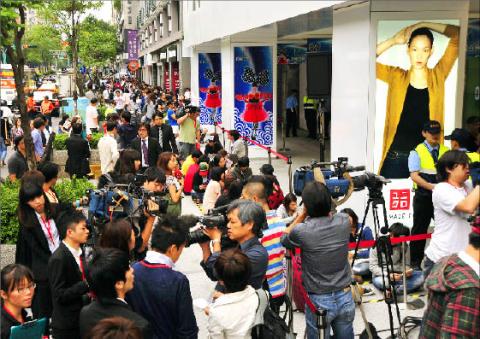Hundreds of people formed a long line along bustling Zhongxiao E Road in Taipei yesterday morning, waiting for the grand opening of Japanese clothes giant Uniqlo’s flagship store in Taiwan.
The Japanese casual wear designer, manufacturer and retailer opened its sixth flagship store in the world in Taipei yesterday.
It is the first of six stores it is planning to launch within two months in Taipei. As of 10am, more than 700 diehard fans of the brand were ready to snap up the clothes once the store opened.

Photo: Pan Shao-tang, Taipei Times
Huang Yu-ting, 24, who happened to have a day off, arrived at about midnight for a place at the head of the line.
Waving her “No. 1” card with a smile, Huang said that her “main target” was a down jacket, adding that her budget for the day was about NT$5,000 to NT$6,000.
Uniqlo’s flagship store occupies the first three floors of the 12-story Ming Yao Department Store (明曜百貨), which also held a grand opening yesterday after seven months of renovation.
Uniqlo’s billionaire founder Tadashi Yanai and Uniqlo Taiwan Ltd chief executive Kousaka Takeshi attended the opening ceremony.
They said they were delighted at the opening and promised to provide top-level service as a way of thanking their customers.
Due to the large crowds at the grand opening of Taiwan’s first Uniqlo store, also in Taipei’s east district, in October last year, the company asked about 500 staff to be on duty yesterday.
When the first Taiwan Uniqlo store opened, 2,500 customers lined up and 7,000 people visited the shop on the first day.
The 3,630m2 flagship store at Ming Yao with 39 fitting rooms and 45 cashier counters is the biggest Uniqlo store in the country,.
Uniqlo casual wear is popular among local young consumers and at present the company has two outlets in Taiwan.
Earlier, Takeshi announced that Uniqlo was launching a plan next year to open 30 outlets each year in Taiwan. The goal is to eventually have 100 outlets around the country.

South Korea’s equity benchmark yesterday crossed a new milestone just a month after surpassing the once-unthinkable 5,000 mark as surging global memory demand powers the country’s biggest chipmakers. The KOSPI advanced as much as 2.6 percent to a record 6,123, with Samsung Electronics Co and SK Hynix Inc each gaining more than 2 percent. With the benchmark now up 45 percent this year, South Korea’s stock market capitalization has also moved past France’s, following last month’s overtaking of Germany’s. Long overlooked by foreign funds, despite being undervalued, South Korean stocks have now emerged as clear winners in the global market. The so-called “artificial intelligence

‘SEISMIC SHIFT’: The researcher forecast there would be about 1.1 billion mobile shipments this year, down from 1.26 billion the prior year and erasing years of gains The global smartphone market is expected to contract 12.9 percent this year due to the unprecedented memorychip shortage, marking “a crisis like no other,” researcher International Data Corp (IDC) said. The new forecast, a dramatic revision down from earlier estimates, gives the latest accounting of the ongoing memory crunch that is affecting every corner of the electronics industry. The demand for advanced memory to power artificial intelligence (AI) tasks has drained global supply until well into next year and jeopardizes the business model of many smartphone makers. IDC forecast about 1.1 billion mobile shipments this year, down from 1.26 billion the prior

People stand in a Pokemon store in Tokyo on Thursday. One of the world highest-grossing franchises is celebrated its 30th anniversary yesterday.

Chinese artificial intelligence (AI) start-up DeepSeek’s (深度求索) latest AI model, set to be released as soon as next week, was trained on Nvidia Corp’s most advanced AI chip, the Blackwell, a senior official of US President Donald Trump’s administration said on Monday, in what could represent a violation of US export controls. The US believes DeepSeek will remove the technical indicators that might reveal its use of American AI chips, the official said, adding that the Blackwells are likely clustered at its data center in Inner Mongolia, an autonomous region of China. The person declined to say how the US government received